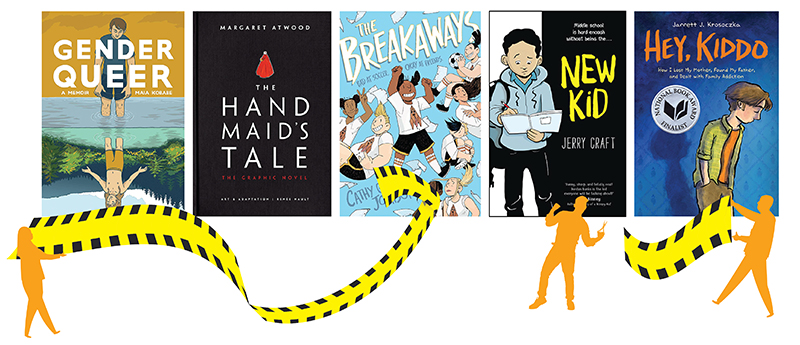From 'Gender Queer' to ‘New Kid', Graphic Novels Are Targeted by Censors
The most challenged graphic novel this fall: Gender Queer. And the award-winning Maia Kobabe memoir remains a frequent target nationwide. Graphic novels are more vulnerable, says Jonathan Friedman of PEN America, as older people simply are less comfortable with them.

It seems to have started during Banned Books Week, ironically: Throughout the fall and winter, a steady drumbeat of book complaints and challenges, mostly in schools but a few in public libraries, has spread across the country.
This fall, Gender Queer by Maia Kobabe was the most challenged graphic novel—and perhaps the most challenged book—nationwide during increased calls to remove “offensive” materials from libraries. But Kobabe’s memoir is far from the only graphic novel people demand be removed from the shelves.
Whether in officially filed challenges or during speeches at school board meetings, parents and organizations nationwide have brought objections to Jerry Craft’s New Kid, Jarrett Krosoczka’s Hey, Kiddo, Cathy Johnson’s The Breakaways, and the graphic adaptation of Margaret Atwood’s The Handmaid’s Tale. Often, news of one book’s challenge spurs a new one somewhere else.
Jonathan Friedman, director of free expression and education at the writers’ organization PEN America, says graphic novels are more vulnerable to challenges, in part because they are still a relatively new and evolving medium, and older people simply are less comfortable with them. Parents also may be more uncomfortable with something depicted visually than with words alone, he says.
“There's no question that groups have formed on social media, that they are sharing excerpts from books—often under the heading that they're concerned about material and books—and they want other parents to know,” says Friedman. “Sometimes that mingles with a much more insidious, skeptical, and critical point concerning schools and libraries in schools and their purpose. So it's difficult to draw the line in some cases between groups that are just concerned parents and groups that are active on other political causes.”
 Some of the people challenging books have also protested mask policies in the schools, for instance, while others want changes in the curriculum. No Left Turn, for example, includes “promote fact-based learning” and “promote classical education in the liberal arts and sciences” among its goals. The organization also specifically targets books and curricula that include “critical race theory” (which is not taught in elementary and secondary schools), “anti-police” attitudes, and sex education.
Some of the people challenging books have also protested mask policies in the schools, for instance, while others want changes in the curriculum. No Left Turn, for example, includes “promote fact-based learning” and “promote classical education in the liberal arts and sciences” among its goals. The organization also specifically targets books and curricula that include “critical race theory” (which is not taught in elementary and secondary schools), “anti-police” attitudes, and sex education.
“The challenges pretty consistently are concerned with books that deal with LGBTQ identities, with sexual activity, or sexual assaults, or themes of racism, immigration, diversity,” Friedman says. “And in particular, anti-racism.”
In some cases, community members have also sought criminal charges against libraries or librarians for having particular books on their shelves.
Read more of SLJ's censorship coverage
In East Bremerton, Washington, a parent tried to file charges against the school staff who purchased Gender Queer for the Olympic High School library. Kitsap County prosecutor Chad Enright reviewed the Washington obscenity statute, which includes a clause stating that it does not apply to libraries under state supervision. While the statute doesn’t specifically mention school libraries, Enright told SLJ that in his opinion it did apply to them.
The statute requires that the book be reviewed as a whole and that in order for the images to be deemed obscene, they must have been designed for the sole purpose of sexual stimulation. “I don't think that the intent of any of these images is for sexual stimulation,” Enright says, “but more importantly, the book as a whole, I don't see that it is written with the intent of sexual stimulation. This book tells a story that, I think, has very some very good redeeming qualities for the reader that is far different from sexual stimulation.”
Enright declined to prosecute. Nonetheless, according to local news reports, the school removed the sole copy of the book from its library, because of its “sexually explicit images”; a spokesperson said the graphic novel “was not thoroughly reviewed before placement in the library.”
Sex Is a Funny Word
In Gillette, WY, a resident tried to press charges against the Campbell County Public Library because of five sex education books, including Cory Silverberg’s graphic novel Sex Is a Funny Word. The county attorney’s office sought assistance from an attorney in a neighboring county to review the case, and he determined it was not prosecutable.
Terri Lesley, the executive director of the Campbell County Library System, says that while she found the episode “discouraging,” at least it couldn’t happen again. “We went through a process and now there's an opinion on it that says that's not prosecutable,” she says. “There is an exemption for public libraries and schools. They went through the different statutes methodically, so it's a pretty strong document.”
Campbell County residents also filed 57 challenges, targeting 29 books, two of which are graphic novels—Gender Queer and A Quick & Easy Guide to Sex and Disability, by A. Andrews (Oni Press, 2020). The library has a well-established challenge system, which Lesley said was not used much in previous years. “It sure has been used a lot in the last six months,” she said. Instead of going through the library’s process, Lesley says, the patrons went directly to the county commissioners, who aren’t involved with the process of challenging a book. But once people understood the process, Lesley said, “we started to receive a lot more” challenges. The library has elected to retain all the challenged books so far, although the two graphic novels were moved to the adult graphic novel section.
“That’s what a good Request for Reconsideration policy is all about,” Lesley says. “The manager reviewed the books and determined that that would have been adult content … so the manager made a decision to move the books to the adult graphic novel collection. And that happened at the meeting between the patron and the manager.”
James Lucas Jones, the publisher of Oni Press, says Gender Queer has always been marketed as an adult graphic novel. However, he points out, age ratings are a marketing tool. “The book won the ALA Alex Award and was an Israel Fishman nonfiction honoree, which would suggest that it had appeal beyond just being considered an ‘adult’ title,” he says.
“Gender Queer is an important story that will resonate with anyone that reads it,” he says. “Maia’s experience is thoughtfully crafted, heartfelt, and relatable. Eir narrative is the kind of story that teens having similar feelings and concerns need to see out there, so they know they’re not alone. That’s such an important thing—to feel like your pain and heartache isn’t this singular, isolated thing, that others have felt that way and that there’s a path through it. Seeing the joy and relief in that journey is such a big deal, too.”
A challenge often brings more attention to a book. While Jones says it’s too early to say how the challenges have impacted the sales of Gender Queer, he is determined to make it available in as many ways as possible, including keeping it in print and making it available on digital library platforms.
Friedman is concerned that removing books from school libraries may mean they are completely unavailable to students. “In some cases, we are talking about children or teenagers who don’t have a public library near them, and the school library is there for that reason,” he says. “So kids with privilege who want to read The Handmaid’s Tale or The Lottery can get it online, but kids without, can’t.”

RELATED
The Adventures of Invisible Boy
King Cheer
Freshman Year
Continental Drifter
The job outlook in 2030: Librarians will be in demand
The job outlook in 2030: Librarians will be in demand
ALREADY A SUBSCRIBER? LOG IN
We are currently offering this content for free. Sign up now to activate your personal profile, where you can save articles for future viewing





Add Comment :-
Be the first reader to comment.
Comment Policy:
Comment should not be empty !!!